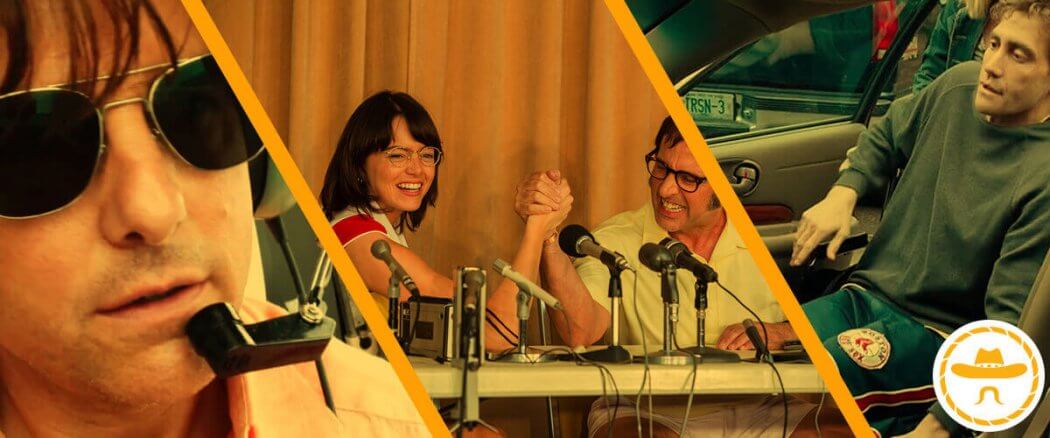Welcome to another edition of Mini-Review Roundup where we present smaller reviews of several movies at once. Up this month: American Made, Battle of the Sexes, and Stronger.
American Made

Scientology may be a made-up religion, but they’ve clearly found the cure for aging. Tom Cruise hasn’t had a birthday in 30 years. He has the same body. He does the same stunts. And with American Made, he’s finally found his clone.
The film chronicles the real-life exploits of Barry Seal, a hot-shot pilot who worked for TWA, the CIA, the Medellín Cartel, and the DEA in a 20-year span that brought him enough adventure and money to last 20 lifetimes. Barry’s secret? Never say no. He jumped head first into any thrill that came his way. He enjoyed pushing himself to the limits. When he fell, he got back up again. The only thing worth avoiding was boredom.
This is also how people describe Cruise. Emily Blunt teased him for his “insatiable positivity” on the set of The Edge of Tomorrow. The studio had a heart attack when he refused to use a stunt double on Mission Impossible: Rogue Nation in a scene where he hangs off the side of a plane as it launches off the runway. And who can forget him jumping on Oprah’s couch during the Katie Holmes fiasco? Yes, Barry and Cruise share much in common. Too much, in fact. Tom Cruise detractors have always accused him of only playing himself. American Made will be their exhibit A. Cruise has disappeared into roles before (cue up a double feature of Born on the Fourth of July and Magnolia for proof), but this outing is undoubtedly the Tom Cruise show. And while we’re buoyed along by his personality, the performance conveys a shallowness that infects the rest of the film.
At least director Doug Liman does an admirable job keeping things moving. American Made is never boring. We bounce around from one event to the next perfectly in step with Barry’s personality. Yet, like Barry himself, there is little time devoted to substance. Liman presents an audacious timeline and rolls the credits as if to say, “All of this happened once. Isn’t that neat?” But we’re no wiser for the journey.
The title of the movie can be viewed as a double entendre. Barry’s excursions were bankrolled by the U.S. government. The CIA acquisitioned his piloting expertise to deliver guns to the Contras of Nicaragua. As long as he proved useful, they were willing to turn a blind eye to his extracurricular activities of smuggling drugs into the U.S. for Pablo Escobar. Finally, after ratcheting up a list of crimes so big that multiple federal agencies were ready to bring him down, the DEA was willing to sweep his entire rap sheet under the rug for help in dismantling the Medellín Cartel. Barry goes from jail to the White House. Meanwhile, a black man in Milwaukee caught with an ounce of marijuana would be flat out of luck. In fact, under the laws of our current administration, he’d automatically receive the maximum charge.
But Barry is also a perverse product of the American Dream itself — a morality based not on should, but could. Barry never gives any thought to the consequences of his actions. When opportunity knocks, he strikes. He has so much money at one point, he literally doesn’t know what to do with it all. His only thought? How to get more. This was the same American disease that brought us the financial crisis of 2008 and the Wells Fargo scandal earlier this year. Make money where you can, while you can. And what happens to these powerful people when they cross the line? We reward them with the same Get Out of Jail Free card Barry received.
Barry Seal left a path of devastation in his wake. How many people died from the drugs he smuggled? Who ended up on the wrong end of the guns he supplied to the Contras? What baggage did his kids inherit from his negligence? If only Liman had explored these missing pieces. But I suppose we can’t blame him. After all, his movie is American made.
Grade: B
Battle of the Sexes

Battle of the Sexes reminds us of a time when women were discriminated against for their gender and had to prove their worth in a male-dominated society. Thank goodness all of that is behind us.
In 1974, Billie Jean King (Emma Stone) was considered the best women’s tennis player in the country. Yet the prize money she received for winning matches was a fraction of her male counterparts. Billy Jean responded by forming a league of her own — the Women’s Tennis Association — which employs the top female tennis players to this day. Keeping a close eye on Billy Jean’s success is the top men’s tennis player from a different era, Bobby Riggs (Steve Carell). Bobby was the king of tennis in the 40’s, but now he’s a has-been who hustles matches for money and longs for the spotlight he once enjoyed. So he does what anyone would do: he becomes a male chauvinist pig and challenges Billie Jean to an exhibition match entitled the “Battle of the Sexes” designed to prove once and for all who is the superior sex. Game on.
Emma Stone has come a long way from her debut turn in Superbad. She won an Oscar last year for La La Land. But incredibly, she’s even better here. Stone latches on to Bobby Jean’s intensity. Tennis is her obsession, but she also feels pulled in other directions. She’s happily married to a man named Larry (Austin Stowell), but a romantic encounter with a woman on tour sends her heart reeling. Soon she finds herself a target of both gender and sexual prejudice, while trying to win a tennis match of consequence for women all over the country.
Carell’s turn may not be in the same league as Stone’s, but his natural charm makes Bobby a likeable character we roll our eyes at rather than loathe. Bobby isn’t a true male chauvinist. It’s just an act. But he still spews enough public bile to make us root against him. Directors Jonathan Dayton and Valerie Faris craft their film like a relic from the 70’s. From the retro studio logo at the start to the period music throughout, we feel like we’re watching footage from a time capsule. Unfortunately, they also fall victim to a number of standard sports clichés including everything coming down to the “big game” at the end. This is a film that’s far better off the court.
Billy Jean isn’t a saint. She breaks her marriage vows without much of a fight when Marilyn (Andrea Riseborough) comes along. Monogamy is so rare it makes headlines these days, but Jesus took the matter seriously. Our “follow your heart” culture is leading us to dead ends, and Christians aren’t leading by example. But Billie Jean was a pioneer, and her efforts were key stepping stones in the fight against bigotry. If only that fight was over.
Three weeks after Sexes was released, the #MeToo movement arrived to remind us how far we still have to go. Sexes highlights a key point that often gets lost in the wake of these scandals: the most insidious evil is always the kind underneath the surface. Men feign responsibility for #MeToo by feeling superior to Harvey Weinstein. But the Harvey Weinsteins and Billy Riggses of the world aren’t the real problem. The real problem is Jack Kramer (Bill Pullman) telling Billie Jean matter-of-factly that men are superior to women. The real problem is the newscaster draping his arm around the shoulder of his female co-host as they announce the “Battle of the Sexes” match together. Flashy examples of evil make us feel better about ourselves, but the roots are the little, daily examples of sexism, racism, and homophobia that go unchecked. And in that fight, no one is exempt.
Billie Jean gave her all in the battle against misogyny. Now it’s up to men to finish the job. Let’s break the patriarchy and crown our sisters with the dignity they deserve. And while we’re at it, let’s give Emma Stone another Oscar.
Grade: B+
Stronger

We’re all looking for a hero. The only problem is they always let us down. Jeff Bauman never wanted to be a hero, but he became one overnight when he survived the Boston Marathon Bombing of 2013. Jeff’s legs were blown off in the first explosion and he woke up in the hospital hours later as a double amputee. Stronger isn’t a movie about the bombings themselves. It’s a story of a man forever changed by them and the struggles he went through to become whole again.
Jake Gyllenhaal plays Jeff. When we first meet him, he’s just a 20-something who works at Costco. He’s got a thick Boston accent, a ton of energy, and undying love for his on-again/off-again girlfriend Erin Hurley (Tatiana Maslany). When we meet them, they’re off-again. Erin is frustrated by Jeff’s inability to show up when it counts. They’ve been here before. But Jeff is determined to prove her wrong, so he makes a sign for her and shows up at the Boston Marathon finish line. The rest is history.
Stronger isn’t a narrative-driven film. It’s a character study, and all character studies live and die by their performances. Thankfully, no one in the film disappoints. Gyllenhaal and Maslany both deserve Oscar-nominations for their work here. There’s nothing Hollywood about these performances. This is stripped-down, raw acting. They embody these souls and we’re with them through every up and down. Director David Gordon Green plays it smart by getting out of the way. He employs a minimalist approach to every facet of filming from the cinematography to the music. This places Gyllenhaal and Maslany front and center where they belong, and their efforts make this one of the best films of the year.
The title of the movie promises a story about someone stronger than the rest of us, a man able to endure what others couldn’t. But Stronger is after the truth. In many ways, the film is a critique of heroism. Erin clings to Jeff after the tragedy, but when reality kicks in she realizes the same problems are there. Jeff has an immature streak. He still lives with his mom. He still gets drunk with his friends. He still forgets important things. Tragedies don’t magically cure our character flaws. If anything, they highlight them.
Meanwhile, Boston has officially declared Jeff a hometown hero. Everywhere he goes, people clap and cheer. Jeff obliges at first, but soon grows increasingly annoyed at the gap between his daily experience and the person they think he is. We all want a hero, but humans disappoint. Perhaps it’s because we’re built for a hero that’s not made of dust.
Humans are capable of acting heroically, like the people who help the victims at the scene of the bombing or the incredible resilience Jeff shows when he first learns of his disability. But these acts come and go, and eventually you’re just a guy with no legs trying to figure out how to go to the bathroom. That’s tragic enough without having to put on a fake smile too. Heroism by human standards doesn’t leave room for bad days, depression, or those who aren’t “survivors.”
Maybe real heroism is more akin to Eugene Peterson’s definition of discipleship: a long obedience in the same direction. There’s nothing flashy about that and the results aren’t guaranteed. But in the end there’s only one true hero anyway, and following in his footsteps is the best mere mortals can hope for.
Grade: A-





